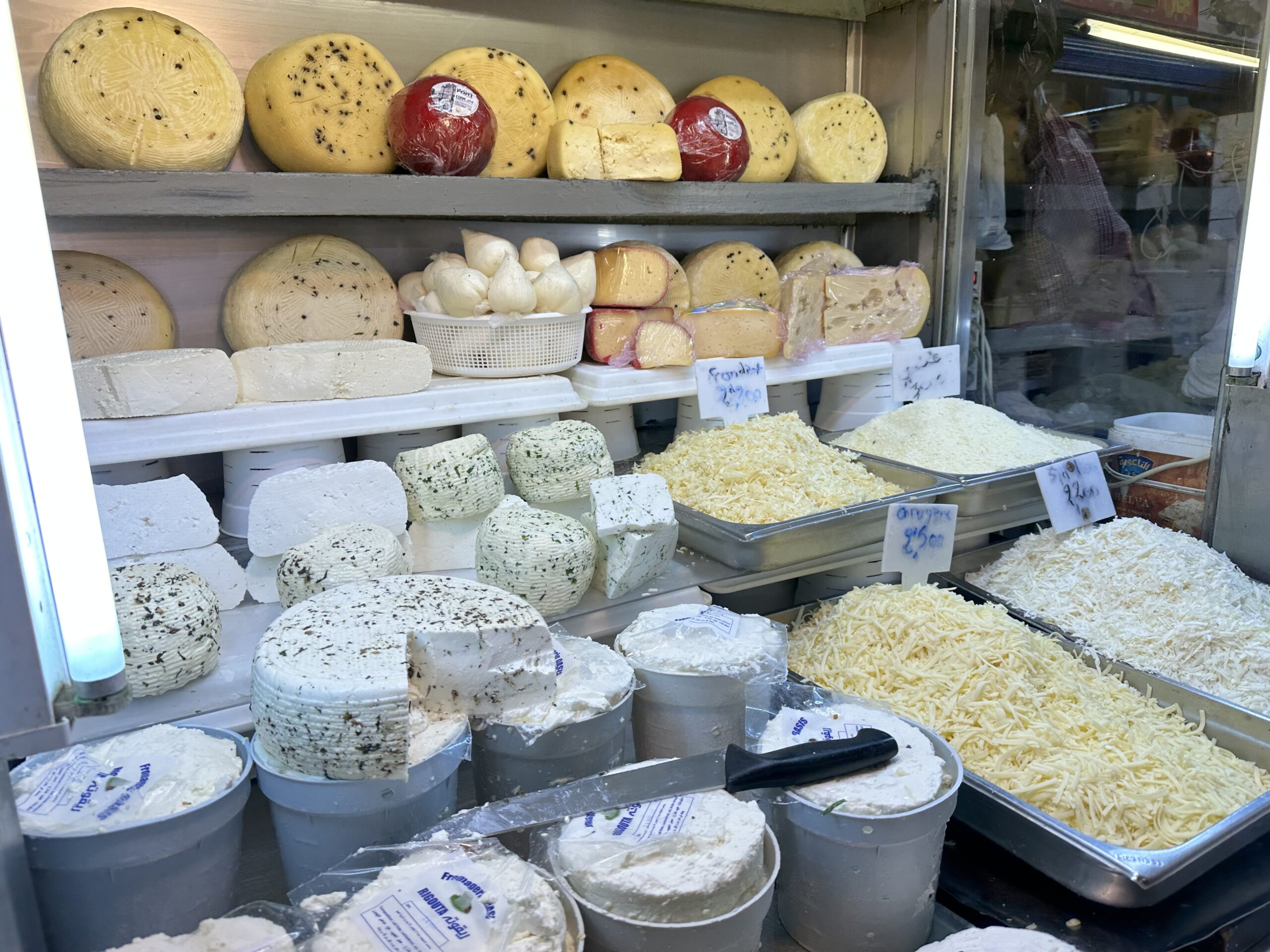
Prepared Cheeses: A Slow Deterioration of Health -الأجبان المستحضرة : الموت البطئ
In recent years, Tunisia has witnessed an increasing wave of commercial greed, especially in the pursuit of fast and abundant profits. This trend is particularly noticeable among investors in the restaurant industry. Many of them—though not all—resort to using manufactured or processed ingredients, which nutritionists and experts in the field have confirmed to be harmful to public health, with potentially serious consequences for both individuals and society. Among these ingredients is cheese.
While the cheeses used in restaurant meals may be delicious and appealing in flavor—often attracting customers—they can, in many cases, pose a serious threat to human health, particularly if they are:
-
Not stored or preserved properly
-
Prepared in unsafe ways
-
Or made from low-quality ingredients
Based on this, several risks can arise:
1. Food Poisoning
-
Some cheeses used in restaurant meals, especially in fast food, such as soft cheeses like white cheese, are more prone to harbor harmful bacteria such as:
-
Listeria
-
Salmonella
-
E. coli
-
-
This risk increases significantly when cheese is:
-
Not kept in proper refrigeration
-
Stored at incorrect temperatures
-
Or used past its expiration date
-
2. Preservatives and Artificial Flavors in Cheese
Investors focused on quick profits often rely on cheap or processed cheeses that contain:
-
Artificial preservatives
-
Artificial flavors and colors
-
Hydrogenated fats
Nutrition and health experts have agreed that these additives may cause long-term health issues such as:
-
High cholesterol
-
Digestive disorders
✅ Preservatives:
Used to extend the shelf life of cheese and prevent bacterial or fungal growth. Common examples include:
-
Potassium Sorbate:
-
Used to prevent mold growth.
-
Safe in small amounts, but excessive use may cause digestive problems or skin irritation.
-
-
Sodium Nitrate / Sodium Nitrite:
-
Help preserve color and prevent bacterial growth.
-
When heated or stored too long, they can form carcinogenic compounds.
-
-
Benzoic Acid:
-
Sometimes used in shredded or liquid cheeses.
-
May cause irritation in sensitive individuals.
-
2. Artificial Flavors:
These are used to enhance the taste, especially in low-quality cheese:
-
Synthetic Cheese Flavors:
-
Not derived from real dairy but from chemical compounds that simulate natural cheese taste.
-
May contain unknown chemical substances.
-
-
Monosodium Glutamate (MSG):
-
Strong flavor enhancer.
-
Some people suffer from “MSG sensitivity” which can cause:
-
Headache
-
Nausea
-
Flushing or heart palpitations
-
-
3. Artificial Coloring:
-
Used to give processed cheeses, like cheddar, an artificial orange color.
-
Examples include Annatto (partially natural) and synthetic dyes like Yellow #5 and #6.
-
Some of these have been linked to hyperactivity in children.
🧫 4. Allergy and Lactose Intolerance Issues
-
Some people have a milk protein allergy or are lactose intolerant, making cheese consumption risky for them.
-
Unfortunately, many restaurants do not clearly disclose the type of cheese used.
🥶 5. Storage and Preservation Problems
-
When cheese is not stored at the right cold temperature, it spoils quickly.
-
Some small or lower-end restaurants may neglect food safety standards.
🍔 6. Processed Cheese in Fast Food
-
The cheese in sandwiches and pizzas is often “fake cheese” (not made from 100% milk).
-
It contains refined vegetable fats and has low nutritional value.
🔍 Tips:
-
Ask about the type of cheese used if you’re unsure of its quality before ordering.
-
Avoid unpasteurized soft cheeses if you’re pregnant or have a weakened immune system.
-
Choose restaurants that care about the quality of their ingredients.
-
Golden tip:
If the cheese melts in a rubbery or overly shiny way—it’s likely processed and full of additives. - خطر الاجبان المستعملة في وجبات المطاعم
- ان الجشع الكبير الذي تعرفه الأوساط التجارية خاصة في البحث عن الربح الوفير في وقت قصير يغزو البلاد التونسية في السنوات الأخيرة وخاصة لدى المستثمرين أموالهم في مجال المطاعم خاصة فيلتجئون في العديد من الأحيان باستثناء القلة القليلة الى الاعتماد على المواد المصنعة والتي اقر خبراء التغذية والمختصن في المجال بانها مضرة بصحة المواطن وتكون لها نتائج وخيمة على حياة افرد والمجموعة ومن هذه المواد نجد الاجبان.فالأجبان المستخدمة في وجبات المطاعم قد تكون لذيذة ومحبوبة وذات نكهة جميلة تجلب الحريف، لكن في بعض الحالات، قد تشكل خطرًا كبيرا على صحة الانسان ، خصوصًا إذا لم يتم تخزينها وحفظها أو إعدادها بشكل سليم، أو إذا كانت من نوعية ذات جودة منخفضة. وعلى هذا الأساس يمكن ان تتعدد هذه المخاطر وتكون مثل :
- التسمم الغذائي
- بعض الأجبان التي يتم تصنيعها واستعمالها في الوجبات المقدمة في المطاعم وخاصة الوجبات السريعة ، وخاصة الاجبان الطرية مثل الجبن الأبيض، تكون أكثر عرضة لنمو البكتيريا الضارة مثل:
- الليستيريا (Listeria)
- السالمونيلا (Salmonella)
- الإيشيريشيا كولاي (E. coli)
- وهذا يرتع هذاالخطرو يزيد إذا لم تُحفظ الأجبان في مبردات خاصة وفي درجات حرارة مناسبة، أو في بعض الأحيان يتم استخدامها بعد انتهاء صلاحيتها.
- المواد الحافظة والمنكهات الصناعية في الأجبان:
- يلتجي خاصة المستثمرون في المطاعم والباحثين عن الربح السريع الى استعمال الكثير من الأجبان ، خصوصًا تلك الرخيصة أو “الجبن المصنع” (processed cheese)، التي تحتوي على:
- مواد حافظة صناعية
- ألوان ونكهات اصطناعية
- دهون مهدرجة
- اقر العديد ومن الخبراء والباحثين في مجال التغذية ان هذه المكونات قد تسبب مشاكل صحية على المدى الطويل مثل ارتفاع الكوليسترول، ومشاكل الجهاز الهضمي.
- المواد الحافظة (Preservatives):
يتم اُستخدام هذه المادة لإطالة عمر الأجبان ومنع نمو البكتيريا أو الفطريات. من أشهرها:
- سوربات البوتاسيوم (Potassium Sorbate):
- يُستخدم لمنع العفن.
- آمن بكميات صغيرة، لكن الإكثار منه قد يسبب مشاكل في الجهاز الهضمي أو تهيج الجلد عند البعض.
- نترات الصوديوم (Sodium Nitrate) / نيتريت الصوديوم (Sodium Nitrite):
- تحفظ اللون وتمنع نمو البكتيريا، لكن عند تسخينها أو تخزينها لفترة طويلة قد تتفاعل لتكوّن مركبات مسرطنة.
- حمض البنزويك (Benzoic Acid):
- يُستخدم أحيانًا في الجبن المبشور أو السائل.
- قد يسبب تهيج عند الأشخاص الحساسين.
- النكهات الصناعية (Artificial Flavors):
هذه النكهات تُستخدم لتعزيز الطعم وجعل الجبن “أطيب”، خاصة إذا كان منخفض الجودة:
- نكهات الجبن الاصطناعية:
- ليست مشتقة من ألبان فعلية، بل عبارة عن مزيج من المواد الكيميائية لمحاكاة طعم الجبن الطبيعي.
- قد تحتوي على مركبات كيميائية غير معروفة
- جلوتامات أحادية الصوديوم (MSG):
- تعزز النكهة بقوة.
- بعض الناس يعانون من “حساسية MSG” وتسبب لهم:
- صداع
- غثيان
- احمرار أو خفقان
- الألوان الصناعية:
- مثل لون الجبن البرتقالي في الشيدر المصنع.
- تستخدم مواد مثل Annatto (طبيعي جزئيًا) أو أصباغ صناعية بعضها مثير للجدل من ناحية التأثير على فرط النشاط عند الأطفال.
🧫 3. مشاكل لمن يعانون من الحساسية أو عدم تحمل اللاكتوز
- بعض الأشخاص لديهم حساسية من بروتين الحليب أو يعانون من عدم تحمل اللاكتوز، ما يجعل تناول الأجبان خطرًا عليهم.
- للأسف، المطاعم لا توضح دائمًا مكونات الجبن المستخدم.
🥶 4. مشاكل في الحفظ والتخزين
- إذا لم تُخزن الأجبان في درجة حرارة منخفضة، قد تتلف بسرعة.
- في بعض المطاعم، خاصة الصغيرة أو الشعبية، لا يتم اتباع تعليمات السلامة الغذائية بدقة.
🍔 5. الجبن المصنع في الوجبات السريعة
- الجبن المستخدم في الساندويتشات والبيتزا غالبًا يكون “جبنًا وهميًا” (غير مشتق من الحليب بنسبة 100%)، يحتوي على دهون نباتية مكررة، ويقل محتواه الغذائي.
نصائح:
- إسأل عن نوع الجبن المستخدم إذا كنت تشك في جودته قبل شراء غرضك .
- تجنّب الجبن الطري غير المبستر إذا كنتِ إمراة حاملًا أو تعاني من ضعف المناعة.
- اختر المطاعم التي تهتم بجودة المكونات.
- نصيحة ذهبية:
- إذا شفت الجبن يذوب بشكل “مطاطي” أو بطبقة لامعة أكثر من الطبيعي – احتمال كبير إنه جبن مصنع مليان مواد مضافة.


